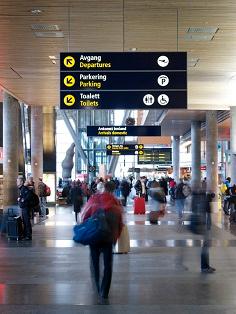2D Hei, pappa! - LearnNoW
Oppslag i bokmålsordboka - skript
2D Hei, pappa!
2D Hei, pappa!

Benjamin står og venter. Nå kommer Dina, Alex og Cecilie. De ser pappa, og Dina roper.
Dina: Hei, pappa! Her er vi!
Pappa: Hei, Dina! Så hyggelig å se deg! Velkommen til Norge!
D: Takk. Nå er vi sammen igjen, pappa.
Mamma: Så hyggelig å se deg igjen. Hvordan går det?
P: Takk, bare bra. Hvordan går det med dere?
D: Det går bra, men det er en lang reise. Jeg er trøtt.
Alex: Jeg er også trøtt.
P: Ja, men nå drar vi hjem.
D: Bra!
De kjører til Fjordvik. Det tar én time.
ENGLISH
Benjamin står og venter. Nå kommer Dina, Alex og Cecilie. De ser pappa, og Dina roper.
Benjamin is waiting. Here comes Dina, Alex and Cecilie. Dina sees daddy and shouts.
Dina: Hei, pappa! Her er vi!
Hi, Dad! Here we are!
Pappa: Hei, Dina! Så hyggelig å se deg! Velkommen til Norge!
Hi, Dina! So nice to see you! Welcome to Norway!
D: Takk. Nå er vi sammen igjen, pappa.
Thank you. Now we are together again, Dad.
Mamma: Så hyggelig å se deg igjen. Hvordan går det?
So nice to see you again. How are you?
P: Takk, bare bra. Hvordan går det med dere?
Thanks, I’m fine. How are you?
D: Det går bra, men det er en lang reise. Jeg er trøtt.
I’m fine, but it’s a long journey. I’m tired.
Alex: Jeg er også trøtt.
I’m tired, too.
P: Ja, men nå drar vi hjem.
Yes, but now we will go home.
D: Bra!
Good!
De kjører til Fjordvik. Det tar én time.
They drive to Fjordvik. It takes one hour.
ve2D
| bare d just, only | |
| bare bra! d just fine! | |
| det går bra! I'm fine! | |
| å | dra v to leave |
| å | gå v to walk, go |
| hjem d home | |
| et | hjem n a home |
| hvordan how | |
| igjen d again | |
| å | kjøre v to drive |
| lang a long | |
| å | rope v to call, cry, shout |
| å | se v to see |
| å | stå v to stand |
| å | ta v to take |
| en | time n an hour |
| trøtt a tired | |
| velkommen welcome |
n = noun, v = verb, a = adjective d = adverb, p = preposition
2.4
2.4 To go
The verb å gå means to walk:
| Vi går til Fjordvik. We are walking to Fjordvik. |
In order to express that you are going somewhere, but not necessarily walking, you need to use another verb like å dra (to leave):
| Vi drar til Fjordvik. We are going to / leaving for Fjordvik (by any means of transport). |
In some contexts, å gå is also used for to go:
| Jeg går på norskkurs. I go to a Norwegian course. |
| Bussen går til Fjordvik. The bus goes to Fjordvik. |
We also use å gå in some other expressions:
| Hvordan går det? How are you? (Literally: How does it go?) |
| Det går bra. I am fine. (Literally: It goes well.) |



